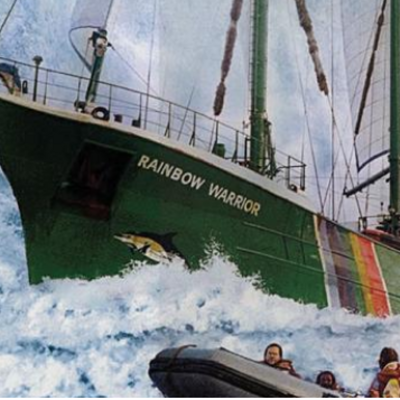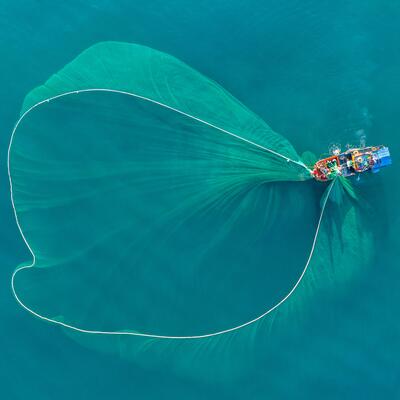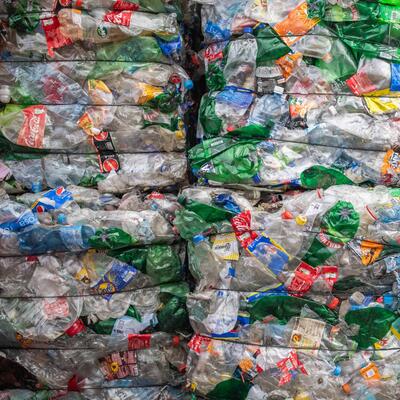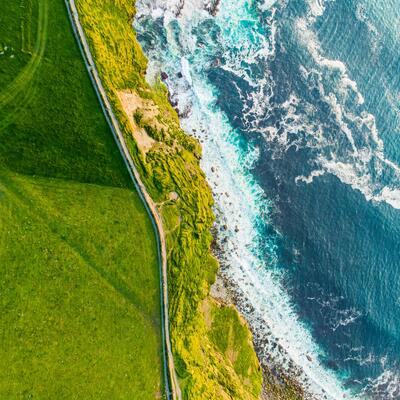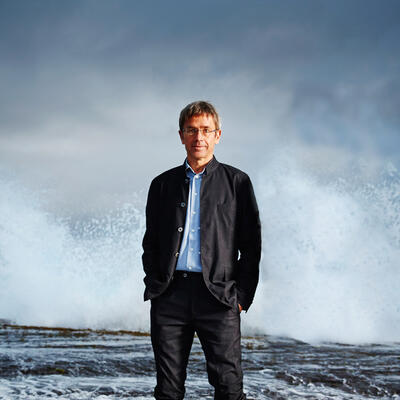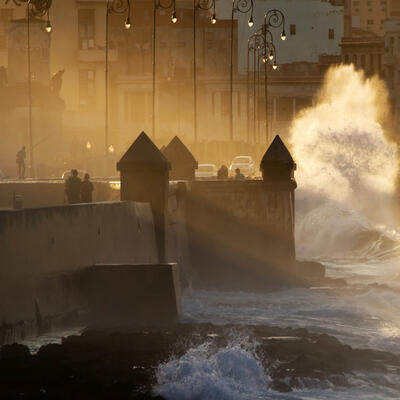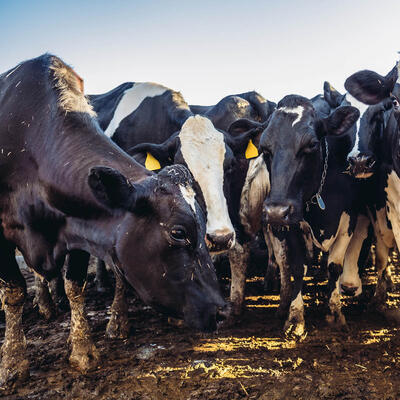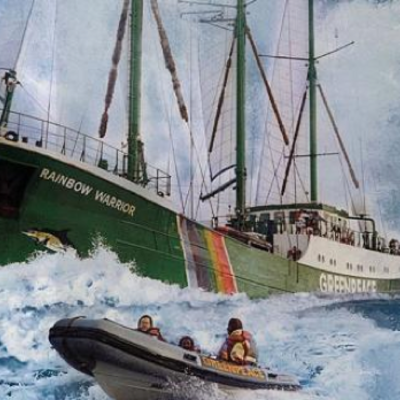
REWIND: Sea Heroes: Extreme Edition
Guests

Liz Taylor
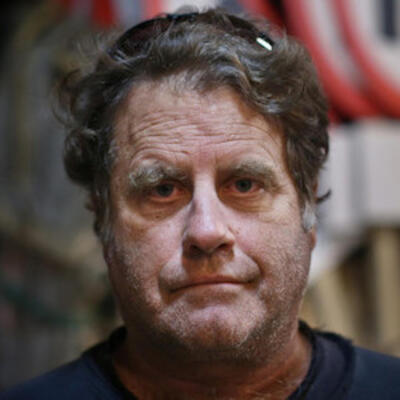
Peter Willcox
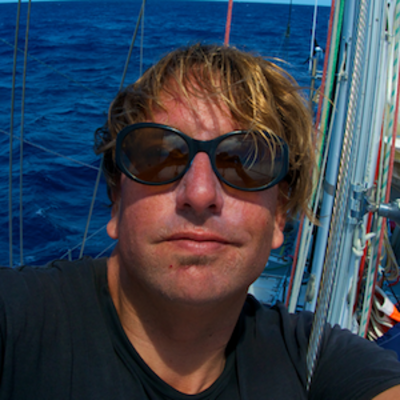
Stiv Wilson
Summary
Our planet’s oceans drive our weather and generate much of our oxygen -- and they’re being severely impacted by climate change. What can be done about it?
Liz Taylor, President, DOER Marine
Peter Willcox, Captain, Rainbow Warrior, author, Greenpeace Captain: My Adventures in Protecting the Future of Our Planet (Thomas Dunne Books, 2016)
Stiv Wilson, Director of Campaigns, Story of Stuff
This program was recorded in front of a live audience at the Commonwealth Club of California on May 12, 2016
Full Transcript
Greg Dalton: From the Commonwealth Club of California, I'm Greg Dalton. Today we’re going to sea with three people who have spent their lives exploring and protecting the world's oceans. The seas generate much of the oxygen we breathe and drive much of the weather we think about when we get dressed every day. But most people know very little about the ocean below the surface and how it's related to climate change. In the next hour, we’ll explore how global warming is impacting the ocean and what you can do about it. We’ll also hear tales of drama and intrigue and violence on the high seas, as well as positive stories about marine ecosystems coming back to life.
Leading us on this journey are three salty veterans of the sea. Liz Taylor is president of DOER Marine, an Alameda based company that builds robots and other vehicles for deep-sea exploration. She grew up learning about the sea with her mother, the legendary ocean explorer Sylvia Earle. Peter Willcox is the former captain of the iconic Greenpeace ship Rainbow Warrior that was sunk by French government agents in 1985. He’s the author of the new autobiography Greenpeace Captain: My Adventures in Protecting the Future of Our Planet. Stiv Wilson is Director of Campaigns at the Story of Stuff, an education and advocacy group based in Berkeley. He sailed over 35,000 nautical miles to four of the big garbage patches in the ocean and lives on a sailboat in the Bay Area. This program is underwritten generously by the Bernard Osher Foundation. Please welcome them to Climate One.
[Applause]
Liz Taylor, let's talk, begin with you and tell us about Hydrolab; it was one of your first experiences in sort of this underwater world.
Liz Taylor: So Hydrolab was a subsea habitat. Very basic basically like underwater camping and a team of aquanauts and mixed team was down about 50, 60 feet in the Bahamas. And my job as a kid maybe 10, 11 years old was to man the radio overnight, make sure that everybody was still breathing. And be ready to alert the surface team of anything went amuck and then during the day to take supplies down to the Hydro Lab. And so it took some ice cream we watched Boyles’ law in action when there is only half-full at the bottom, things of that nature. Didn't smuggle any rum down to them even though they asked but it was great.
Greg Dalton: And so that turned you on to sort of a life of the sea or did you have any choice maybe it was for –
Liz Taylor: Well I was kind of thrown in early on but to breathe normally underwater worked out alright. But what is interesting I mean just spending a few weeks there traveling down every day began to recognize the fishes as individuals. There was a barracuda that was always there underneath the surface barge and just very big curious animal, bigger than I was but not aggressive at all, he just checked everything out, kind of like the resident watchdog.
Greg Dalton: Fabulous. Peter Willcox, you started sailing at six months old which just terrifies me as a parent. But tell us how you started came from a sailing family, six months old.
Peter Willcox: I did, my grandparents were sailors my father is still a sailor today. And I caught the bug at an early age it's something I've always enjoyed doing. Last year I sailed 18,000 miles and I came home and I went sailing. That and sailing for a reason, is what makes it so rewarding.
Greg Dalton: And we’ll get to some of your stories. Stiv Wilson, you were a surfer and had a seminal moment where you realized that you wanted to focus on oceans and on advocacy way. So tell us about that moment when you were surfing.
Stiv Wilson: Yeah, I actually started surfing when I was 30 years old on the Oregon coast. It was very pristine and beautiful place. The Oregon coast is very remote comparatively to California and it was just primeval wood you can’t see a human made object from the lineup. And I came in, my dog was running on the beach and he seemed distressed and I thought he might've lost his tennis ball. And I was sort of looking around and then I noticed just tons and tons of plastic on the beach and what assailed my senses was the aesthetic incongruity to the natural order there. Not necessarily the environmental implications, but that put me on this journey of working on plastics issues in the ocean for the rest my life.
Greg Dalton: We’ll get into some of that plastics and exploration and ocean stewardship. Peter Willcox, take us to the Rainbow Warrior in 1985; you’re in Auckland and you woke up. So tell us what happened then.
Peter Willcox: Well, 1985 was our year of protesting nuclear testing in the Pacific. We had just come from the Marshall Islands where we had relocated a group of Marshallese people that have been used by the U.S. Military purposely as guinea pigs to test the effects of radioactive fallout. And over the years that generation from 1955 when the first hydrogen or the biggest hydrogen bomb the 20 megaton Bravo shot was launched until 1980, which is when they started appealing to a way they’ve had increasingly poor health, especially in women's reproductive health issues where many women had 6, 7, 8 miscarriages.
They had jellyfish babies, which is just what it sounds like. And after as I said, a generation of this they appealed to the U.S. and the Marshall's government to move them. They said no. So five years later when we came with the Rainbow Warrior we did move them about 150 miles away. After that we went down to New Zealand to resupply for a trip out to the Polynesia where the French had been testing nuclear weapons for many years. The French were worried about this and so they sent a team of soldiers, espionage people, whatever you want to call them to New Zealand. They sailed in with some explosives, one night about the fourth night after we were in they took us two of them took two of the divers went across the harbor, tied up on the pier across from us, dove underwater planted the bombs, swam back and went back across the harbor.
The people from across the harbor saw them come in throw the outboard engine over the side. Drag the boat at the beach and leave it there halfway up and then jumped into a waiting camper van. And they thought, oh some kids have stolen the boat again so they wrote down the number. About two hours later, on board the Rainbow Warrior the boat shook fantastically. I was asleep in bed. I thought initially that we had been involved with a collision with another ship at sea. When I looked out, the lights, the port hole in my cabin to the dock I could tell that we were safely tied to the dock. But the sounds weren't right, so I got up. About 40 seconds after the bomb went off I'd made it 20, 30 feet back to the engine room door and the boat was already almost completely flooded. The water level was 2 feet below our feet where at normally should have been 15 or 16 feet and you couldn't see it. So my first thought was to go back to the after accommodations where people were rising.
The first bomb went off about a minute later. The second bomb went off and it had given our photographer Fernando Pereira just enough time to go to his cabin. And the second bomb was directly underneath his cabin. It racked the door and he drowned in his cabin. I got off on the dock and there was not anything we could do. There was tons of diesel fuel floating on the surface. We were questioned by the police most of the night, they were furious at first it was only the second act of political terrorism in New Zealand history. Going to New Zealand for us at the time in 1985 felt a bit like coming home because they were about to become a nuclear free zone and we felt so welcomed there and relaxed.
What happened then was the two French agents who were masquerading as Swiss tourists, the next day about 36 hours after the boat had been bombed returned the camper van to the airport, asking for a refund for a day’s rental because they had to fly home early because her uncle was sick in Switzerland. Well there's a big note under the counter. They were detained by police, interrogated and put in a hotel room that night and said “Look we’re sorry we’ll take you to the airport in the morning. Please feel free to order room service, use the phone, do whatever you want just please don't leave the hotel room.” So the agents immediately got on the telephone to Paris DSEG headquarters and said “We blew up the boat it all went cool but we’ve been detained but we’ll be home tomorrow.” The New Zealand police recorded the whole thing. Two days later they were arraigned and about a month later they copped a plea to second-degree murder. Obviously losing a shipmate is about as bad a thing that can happen on a ship; it’s the Captain’s first priority to keep his crew safe.
And it was a bad day, but all of us on the boat felt in some weird way that if we had scared the government of a first world superpower so badly they would set out to kill us, that we must be doing something right. And myself and another crew member sailed out to Moruroa a couple months later on the Greenpeace sailboat that had been out there many times. We sailed across the 12 mile limit when the French announced that they were going to do a very small insignificant nuclear test. We’re arrested and deported banned for life from French Polynesia. Eventually a couple years later the French were forced because they wanted their agents back from New Zealand to arbitrate with Greenpeace and paid us quite a bit of money. But they have never apologized either to us or the Pereira family.
Greg Dalton: One of the agents expressed remorse that he was involved in it?
Peter Willcox: He absolutely did, and I think that was a courageous move on his part. I appreciate his sincerity. I have no doubt the Pereira family has not accepted his apology and I don't think it's a matter that for me to say yes or no. They feel it's too little too late, that France or he had a responsibility to say something 35 years ago and this happened 30 years ago.
Greg Dalton: Is there any indication or evidence how far this went in the French government?
Peter Willcox: Yes, absolutely. We learned 20 years after the bombing that it had been approved by President Mitterrand. It had come right from the top.
Greg Dalton: We’re talking about sea adventures at Climate One. And that was Peter Willcox, former captain of the Rainbow Warrior.
Peter Willcox: I’m sorry; I’m still Captain of the Rainbow Warrior.
[Laughter]
Greg Dalton: Still captain, there you go. And there’s Rainbow Warriors 1, 2 and 3. So you’re now captain of the number 3 which is looks fantastic.
Peter Willcox: Thank you. It’s just a funny issue because I've been introduced for 20 years as the former captain of the Rainbow Warrior. And I don't know how it happened but here I still am.
Greg Dalton: People think that it sunk and there’s two other ships after in that.
Greg Dalton: Liz Taylor, tell us what you're seeing below the sea in the oceans about climate impacts. How is climate change changing the oceans?
Liz Taylor: Well, we’re seeing a lot of it happen in terms of the just the ocean temperatures. We’re looking at this great bleaching that's going on in the Great Barrier Reef right now. It’s just devastating about 90% gone of the Great Barrier Reef. It's shocking.
Greg Dalton: Can it come back?
Liz Taylor: There's hope that parts of it can come back. It depends on how long the surface temperature is sustained at a high rate. With the remotely operated vehicles and human occupied vehicles that we are developing, we’re able to go down into deeper water and see if some of these corals are coming back. Were they more resilient where the water is cooler instead of just being at the surface? There's some discussion about transplanting corals from deeper water back into shallower water as temperatures cool. We’re trying to collect them, and then to rear them in captivity in the same way that some other endangered species have been saved. Now we are looking at being able to do that for corals. But it’s quite shocking to see these sudden changes happening just, you know, we’re all witnesses to it.
Peter Willcox: I would like to add to Liz’s story that we were down on the Great Barrier Reef three years ago and got a chance to talk to the scientists from Townsville who know coral. They were hypothesizing that was then 15 to 20 years the waters would be too warm and acidic to support coral growth.
And here we are three years later, with major sections of the reef gone and that's the one constant that’s in climate change is that you make a prediction, two or three years later you can tear it up and start all over again.
Greg Dalton: It's happening faster. Why is coral so important as the base of the food chain? And why is that so important, Liz Taylor?
Liz Taylor: Well, it’s I mean well the plankton is really the base of the food chain but the coral contribute to that when they spawn all their little corallettes are water born into the into the planktonic soup that’s there. But beyond that they are very important barrier to storm damage and they’re one of the first lines of defense that we have. So we have all this goes to development most of the population lives in 50 miles of the coast around the world. And so if we’re tearing down things like mangroves and coral reefs are dying that just opens the door for these huge storm surges to race in much further in than they would have in the past. So the coral reef helps to calm the storm conditions ahead of them reaching the shore and so they're very critical for that reason. And just the myriad of fish that they support, all kind of different fishes there.
Greg Dalton: And lots of people subsist on – farmers rely on that fish. So it gets to people pretty quickly. Stiv Wilson, what does an average American and their lifestyle what are some of the most impactful things that we do as consumers that get to the oceans?
Stiv Wilson: You know, really I work on plastics in the ocean because I like to think of it as the visual evidence of climate change. About 10% of petroleum products go to the production of plastics. Interestingly with coral, coral is filter feeders and fibers from synthetic clothing that come off in the washing machine. About every load of laundry about 1,900 fibers going out into the ocean. Ultimately coral is choking on this too so they’re kind of getting a one-two punch from acidification and synthetics.
And the footprint of plastics per capita in the United States is about 326 pounds of plastic per person per year, 50% of which is single-use plastics. So if you want to talk about the most impactful not only problem but also empowering device is getting out of single use plastics. You can literally reduce 50% of your footprint overnight.
Greg Dalton: And we've heard about bag bans, plastic bag bans. I heard from you the first time about straw bans. So why are plastic straws, tell us the scale and scope of plastic straws and what's being done about it.
Stiv Wilson: Well, San Francisco is sort of leading the way. There may be a measure introduced to ban them. We as Americans use 500 million of them a day. There’s 308 million people in the country. So I don't know if you've had your quota of 1-1/2 straws today, but that's about how many we use.
Greg Dalton: And why do bars like them so much?
Stiv Wilson: Well there's been some research to determine that if you drink your dark and stormy which is my drink of choice, that you’re going to drink two of them if you have a straw rather than just one.
Greg Dalton: Peter Willcox, we’re talking about, you know, banning things and Greenpeace is, environmentalists are often thought about stopping things. Stop bags, stop straws, is that really gonna be effective or is that just kind of a game of whack a mole?
Peter Willcox: Oh geez, I don’t know. You know, listening to these folks to my right. I'm aware that as people on the planet we don't take good care of the oceans. We don't pay the first attention to them. A farmer living at home would never treat his farm the way we treat the oceans.
We constantly overfish, we constantly fish a species to decimation and then we move on to the next one. And Greenpeace believes that the oceans are a resource that need to be shared by everybody and can produce a lot of food for everybody. But when we overfish a species into extinction, we’re destroying the resource. And we’ve done this over and over and over again. Most recently we have wiped out the tuna by three quarters of their normal population. And that's not the way to get the most food out of the ocean. But there's no regulations on the high seas and that's something we desperately need to change.
Greg Dalton: Liz Taylor, is sustainable aquaculture or farming what’s the way to do it right in terms of to utilize the oceans bounty for humans without overdoing it?
Liz Taylor: Well, first of all we need to stop treating the ocean as a supermarket and a sewer at the same time; that’s kind of fundamental. But beyond that, it's really looking at do we want to continue this kind of trade in global wildlife. You know, we’re shipping fish all around the world. We have tuna that are caught off the coast here or caught elsewhere and they’re shipped overnight to a fish market in Japan. That’s a huge carbon footprint. It seems a more logical way to fish locally, fish with artisanal methods of hook and line and not have these massive commercial trawling operations going on. The McDonald's filet o’ fish sandwich supports the largest trawler a ship more than 400 feet long in the Bering Sea. That just takes metric tons of pollock out of the environment and, you know, how does that affect the other animals that rely upon that food source?
Greg Dalton: I've read that even there is fish caught off the coast of the United Kingdom, sent to China for processing and then back to the UK for fish and chips. So that, yeah –
Liz Taylor: Right. So I mean the answer is to know where your fish comes from. Know your fishmonger, make sure that the methodology used is as low-impact as possible.
And for the farm fish, you know, maybe bring it onshore in these closed systems. Don't discharge things directly into the ocean or feeding antibiotics to fish that are penned in the ocean. You could be doing it onshore.
Greg Dalton: Peter Willcox, do you eat fish?
Peter Willcox: I do more and more reluctantly every, all the time. I haven't eaten meat for 40 years because I read how President Reagan was signing a special bill every year, allowing beef farmers to use steroids and hormones to grow their beef. Yet he was serving organic beef at the White House so he knew better. That made me so mad I gave up on meat. And now I listen to these folks and I realized that even wild caught fish contain a high number amount of plastics. I don't know how much longer I will.
Greg Dalton: There is even a report recently about cocaine found in salmon off the coast of Seattle.
Peter Willcox: Yeah, the NPR report.
Greg Dalton: Stiv Wilson, what did you think about when you heard that story?
Stiv Wilson: Well, I was wondering how they get up these very rough streams to spawn and now it seems to make sense.
[Laughter]
Greg Dalton: And how about your personal diet?
Stiv Wilson: I don't eat fish and that largely comes from, you know, when you’re sailing across an ocean you often just have a line dragging, you know, you can catch a Dorado or a tuna and, you know, we would get to these very remote places in the South Pacific with these reef systems and there’d be no fish. And there’d be tons of plastic on the beach but no fish. And it just – and there is one atoll in the South Pacific called Henderson which is actually where Herman Melville got the idea for Moby Dick from chasing a whale there. And I, you know, swimming to shore I was like this should be Shangri-La. This should be the Jacques Cousteau video that I saw when I was kid and there was nothing there.
Greg Dalton: We’re talking about ocean conservation and exploration and age of climate change at Climate One. We’re talking with Peter Willcox, Captain of the Rainbow Warrior Greenpeace ship. Liz Taylor, who is an explorer based in Alameda and Stiv Wilson, who’s a plastics expert.
I want to go to our speed round, lightning round and ask a couple some quick questions of each of our guests today at Climate One. Stiv Wilson, bans on plastic bags are feel-good measures that don't address bigger threats to the ocean?
Stiv Wilson: False.
Greg Dalton: Liz Taylor, most you do work with industry and we’ll get into that in a minute. Liz Taylor, most offshore oil wells are operated safely and responsibly?
Liz Taylor: Maybe.
Greg Dalton: We’ll get to Peter Willcox’s vacation in Russia. Peter Willcox, is the food in the Russian jails better or worse than the food in American jails?
Peter Willcox: Fortunately, I don’t know. I haven’t been in that many American jails.
[Laughter]
Greg Dalton: Maybe some of your Greenpeace colleagues here in the audience have. Peter Willcox, is Siberia a good place for a vacation?
Peter Willcox: I wasn't in Siberia, I was in Murmansk which is the only ice free port Russia has on the northern shore and I was in St. Petersburg.
Greg Dalton: Okay and so we’ll get to that story. This is a quick word association. If I mention a word, just what pops into your mind first. Don’t need to explain it; just the association is what we’re looking for. Peter Willcox, sea world.
Peter Willcox: Orcas.
Greg Dalton: Liz Taylor, the actress Liz Taylor.
Liz Taylor: Still alive.
[Laughter]
Greg Dalton: Peter Willcox, the ocean protection group Sea Shepherd.
Peter Willcox: Good group. I don’t appreciate their sometimes use of violence.
Greg Dalton: Stiv Wilson, the proposed new coal terminal in Oakland.
Stiv Wilson: Bad.
[Laughter]
[Applause]
Greg Dalton: Peter Willcox, Bluefin tuna.
Peter Willcox: Threatened in their existence.
Greg Dalton: Liz Taylor, the U.S. Navy.
Liz Taylor: They’d like a better white front door.
Greg Dalton: Peter Willcox, French food.
Peter Willcox: Excellent.
Greg Dalton: French agents.
Peter Willcox: Not so smart.
Greg Dalton: Okay. That ends our lighting round. How they do, I think they did pretty well. Let’s give them a –
[Applause]
– round for getting through the –
Greg Dalton: Who are some of your sea heroes? Liz Taylor, who are adventurers that you look to, people that are protecting and stewarding the oceans?
Liz Taylor: Well, increasingly I think we’re seeing real heroism from citizen scientists, people that are every day trying to go out and make positive change. Whether they’re staging a beach cleanup or there’s a sailor that's looking for ghost fishing gear or they're contributing to the different NGOs and trying to keep them going and just making good personal choices, educating themselves.
Greg Dalton: And what are some technologies that are enabling them to do that?
Liz Taylor: Well, certainly we’re seeing the Internet is a huge thing. You know, we worked at DOER Marine we worked for three years with Google on the Google ocean layer in Google Earth. We converted it from being Google dirt to being Google Ocean, the whole thing.
Greg Dalton: Initially, it just had lands not the ocean, okay.
Liz Taylor: Exactly, the ocean was left out in the beginning. But we work to them and with the U.S. Navy so it’s kind of a three-way team with a cooperative research and development agreement. And we brought in partners from around the world to add their content into that platform. And I think it's something that will continue to grow that will have the ability for more people to add their adventures, their observations and has its big searchable encyclopedia for the world be very powerful.
Greg Dalton: For a part of the world that’s kind of off the radar for most people they don't go there. Stiv Wilson, sea heroes who are your ocean adventure protection heroes?
Stiv Wilson: Well when I was – I mean Jacques Cousteau is that's what really opened my brain to this whole other world that ultimately comprises 70% of planet Earth. And it’s funny my girlfriend is actually knitting me six red caps that Jacques Cousteau so there will be a requirement on my sailboat that going in and out of port that everybody will have to wear a red Jacques Cousteau cap.
Greg Dalton: Nice homage to the King. Peter Willcox, heroes.
Peter Willcox: Well there’s a French yachtsman named Eric Tabarly who over and over again just did extraordinary things with sailboats. And he's always somebody I have looked up to.
Greg Dalton: Cuba recently opened up, is opening up more so and Liz Taylor, Cuba is one of the few places hasn't been trampled by tourism, et cetera. I’d like to hear from any of you if that's a place for exciting undersea exploration. There's some sea life there that might be less touched by humans than elsewhere in the world.
Liz Taylor: Well, a lot of people are looking to Cuba to see what’s going happen. There's a lot of concern about the opening of the cruise ship industry in there and what’s going to happen with discharge from these large vessels. It’s very, very pristine at the moment and will they have the wisdom and the courage to sustain it in a pristine state or will they just capitulate to capitalism. So it does represent an opportunity for again, to serve a nursery opportunity for corals that have been decimated elsewhere through the Caribbean. And I think it represents the opportunities for sustainable tourism with just really eco-innovation if you will looking for new ways we can enjoy these environments without large footprints. So whether it's highly regulated diving whether it's diving with small submersibles so we’re standing off the reef but we’re able to spend more time at depth; there’s a variety of ways it could be done.
Greg Dalton: Peter Willcox, marine protected areas are one of the positive stories in the ocean. There are basically national parks in the oceans and some of the people would say that they've actually come back some of those areas signed into law by George W. Bush. Do you see that as one of the bright hopes in the ocean, we can set some areas off-limits and maybe they’ll come back?
Peter Willcox: Well we have to respect the ocean, that's a start. And Marine protected areas are an excellent way to do it. We haven't nearly done enough. We’re still decimating the life in the oceans by overfishing. Everything else we do our activities are not congruent with protecting the ocean. Marine protected areas are a good way to start, but we haven't done nearly enough of them.
Greg Dalton: Liz Taylor, marine protected areas?
Liz Taylor: Well like you’re saying we really need to do a lot more. One of the goals is the loftier goals is 20% by 2020 for ocean protection. But, you know, we see marine protected areas and we have a lot of them right along our own coasts here the marine sanctuaries, Cordell Banks, Gulf of the Farallones. And yet fishing is still allowed in those areas to some extent. So we really need areas where these animals can just be left alone and there’ll be plenty of fishing outside the boundaries but we need to spend more time in the ocean directly observing to understand where the real key areas are for breeding, for resting. Somewhat what Ducks Unlimited did on the land where they went out they observed, this is where the ducks are breeding we need to protect these areas, and yet a hunter can still go out and take a few ducks but we don't have commercial duck hunting anymore.
Greg Dalton: Stiv Wilson, you’ve been out to the plastic gyres, these garbage patches. Can they come back to life? You’re a plastics expert.
Stiv Wilson: Yeah, I mean this will astonish you, but people talk about the garbage patches as being the final resting place. The plastic will never escape there and it's there in perpetuity. The good news is actually when these gyres rotate, takes the North Pacific gyre takes about three years to rotate, spits out about 50% of its contents. That’s either gonna enter another gyre or wash up on land. So I mean hopefully what I say is beach cleanup is gyre cleanup. If you're capturing that stuff before a surge or a storm puts it back in the ocean, you have effectively clean the ocean. So the key is we need to stop it going in. I mean the first thing you do when a bathtub is overflowing is you turn off the faucet. And that's what we need to do is turn off the spigot and then the ocean will take care of itself. The best thing to do for the ocean, it seems, is to leave it alone and it'll figure itself out.
Greg Dalton: Nature's okay without us. Talk about the microbeads story.
Stiv Wilson: Yeah, so I had spent all this time at sea looking at plastics and I'm originally from Minnesota and I grew up sailing we have 10,000 lakes there. But I wasn't a salty dog as you say; at that point I was a fresh dog I guess. But after doing all this, you know, adventure around the world what I realized is, you know, very few people actually have a connection an emotional connection to the middle of the ocean.
And so, you know, bringing it back to my boy Jacques Cousteau he said, you know, we protect what we love. So I said let's look at the Great Lakes. Let's see if we find plastics in the Great Lakes. And we found really big concentrations of them. Hitched a ride on a tall ship out of Erie, Pennsylvania it was a replica of a war of 1812 brig, it was actually pretty funny. We were literally hitching a ride and I would ask the captain if I could throw the trawl in, he’s like oh, we’re just actually about to be in a battle reenactment. And I was like, that's why you’re dressed funny. So but we did find these really high concentrations of these plastic beads that were traced back to personal care products, scrubs and toothpaste. And that said, I started a campaign about 3 1/2 years ago to get rid of them and happy to say, through both California State legislation which gave us the leverage for a federal legislation. Obama signed my bill at the end of 2015 and we have effectively eliminated them from commerce in the Western world.
[Applause]
[CLIMATE ONE MINUTE]
Announcer: And now, here’s a Climate One Minute.
There’s a growing amount of plastic choking our oceans – and yet, we keep making more. Adam Lowry of Method Products says our planet already has all the plastic it needs. His company harvests the plastic from oceans and beaches and recycles it into bottles for its cleaning products.
Adam Lowry: Now, the reason we've done this product is really to raise awareness. We’re not trying to solve the ocean plastic problem by taking plastic out of the oceans and making bottles out of it, but by doing that we’re demonstrating that what people say is impossible actually is possible. And I believe taking sort of the first most important step towards addressing the ocean plastic pollution problem.
We gather the plastic for our ocean plastic bottle on the beaches of Hawaii because, it's sort of horrifying, but the beaches of Hawaii actually act as a natural sieve, and they collect the types of plastic that we can use to put back into a recyclable bottle. But like I said, this is really done to raise awareness about the fact that we should use the plastic that's already on the planet. As consumers, we should demand products that come from recycled plastics because it's a solution we have today that works and, combined with other things, it's a solution that I believe is not utilized enough.
Announcer: That’s Adam Lowry, co-founder of Method Products, speaking at Climate One in 2014. Now, let’s join Greg Dalton and our live audience at the Commonwealth Club.
[END CLIMATE ONE MINUTE]
Greg Dalton: We’re talking about the oceans and plastics and climate change at Climate One. That’s Stiv Wilson, director of campaigns at the Story of Stuff and a sailor. Also today here with Peter Willcox, Captain of the Rainbow Warrior for Greenpeace and Liz Taylor, who's directs a company that explores the deep ocean.
Peter Willcox, let’s go back to your Arctic vacation. You were on the Arctic Sunrise in 2013 going out in the Barents Sea after Gazrprom which is a large Russian gas company. Tell us that story.
Peter Willcox: Yeah, as Siberian oil fields wind down Russia is very interested in maintaining its petroleum exports, which is a huge their biggest export. So they opened up oil drilling in the Arctic Ocean. Now the Russian oil industry as a rule, and this is something that shocked me, spills five times what BP spilled in the Gulf every year just as a way of doing business. They do not have a good track record. You could say that they’re about the farthest thing from it. Combine that with what scientists are telling us that we need to leave fossil fuels in the ground if we’re going to do any mitigating of climate change. And I think you'll agree that the idea of the Russians drilling for oil in the most hazardous marine environment possible is not a good idea.
We had gone up in 2012 and planted a banner on the rig taking pictures and come away and it was no big deal. When we went back in 2013 they immediately started shooting machine guns at us, not at us but in the water. We have videos of machine gun bullets landing 3, 4 feet away from our inflatable. The Russian Coast Guard guys came up in their rubber boats and start slashing ours with knives and they, we got two climbers up the side of this really massive rig. I mean, this rig goes up about 100 feet above the water and its solid steel on all sides because they need to protect the pipes and the drilling equipment from the ice. And these steel walls go right down to the ocean floor, which at that point is about 120 feet deep, and then most of it is filled up with stones to make it just as strong as possible against the ice. But we put a couple climbers up there and the Coast Guard guys started pulling them way away from the rig and smashing them back into it in a real, real dangerous situation. So they came down and we’re arrested and we spent about the next 36 hours having face-offs with the Russians who wanted us to leave.
We didn't want to leave; this rig is in international waters. Now it's inside the Russian EEZ; they have every right internationally to drill for oil in that place. What they're doing wasn't illegal; it was just in our opinion, not very well guided. 36 hours after we did the operation they flew over us with a helicopter, spetsnaz, special forces sailed down onto the deck. The Russian spetsnaz guys don't wear any insignia they wear balaclavas and they’re a little scary at first. They rounded all the crew up and pushed the crew onto a couple cabin, searched them, searched all the cabins, stole everybody's liquor and immediately got wildly hammered that night so we had a dozen spetsnaz guys running around drunk as skunks, while we were supposedly being arrested. The next morning they start, they towed us the four-day tow to Murmansk. And up to that point it all fell pretty much like another day at the office. We’ve been arrested before we’ve had this before it just felt to me very déjà vu. We got into Murmansk and the first surprise was an embassy everybody's embassy officials came out. The American one came into my cabin and said, oh I think you guys are in trouble and I said, nah, I ain’t worried about it. He said, I hope you're right. And he left a few minutes later the soldiers told us that we're going to go into shore for a couple hours. Maybe we should bring a toothbrush with us, that's all we have to bring. So we went into the investigator's office and the first thing they told us was we’re getting done for piracy, which in Russia is 10 to 15 years in jail.
Now the way the Russian judicial system works is that once you’re put in detention there is a 99.99% chance you'll be found guilty at trial. The trial’s pretty much of a rubberstamp just to finish off your detention before you start your prison sentence. (0:49:11)
So them telling us that we were going to be spending 10 to 15 years in Russia and we better start studying Russian because we need it when we got to the work camps, it was not very reassuring. And it was a month before I was able to meet with a lawyer or contact my wife Maggie home to find out what was going on. The food was not very good but your friends can send you food into the detention center, which is an unusual part about the Russian system. So once we got our supply line set up we did all right and we start getting some clothes sent because nobody had enough. After a month or I guess about five weeks the charges, they added the charges of hooliganism to our piracy thing. They have no way of taking away the piracy charge. The mechanism just doesn't exist, as does neither does the mechanism for receiving bail money. They just don't do that in Russia.
Six weeks after we were detained we were transferred down to St. Petersburg where I got a chance to spend some time in the Europe's oldest jail which was built in 1860 called the Kresty it wasn't a bad place. Two weeks later we had to have another detention hearing and that's where we were given bail. We were held under city arrest in St. Petersburg for a month and finally the Duma passed an amnesty which was also what was used to kick Pussy Riot out of jail. Although I have to say in their case, being the incredibly strong women they were, they wouldn't leave. They had been in jail for 20 months they only have four months to go, they didn’t want amnesty which confers that you had done something wrong in the first place. We, on the other hand, we’re like no problem I'm ready. Thank you very much. (0:51:04)
They threw them out of jail physically threw them out of the jail. I didn’t have to be thrown out. But I think the person in Moscow who decided to have us arrested in the first place knew that the amnesty was going to be coming up. It was something the Russians do every 10 years to celebrate their new constitution after the fall of the Soviet Union. And Soshi, the Olympics were coming up they didn't want us in jail for the Olympics. But I think it was their way of sending us a message that we had better no longer mess with their ambitions to do more oil exploration in the Arctic. I'm not sure what our plans will be for the future if somebody had asked me before I left that, you know, you might go to jail for a couple months but you’ll radically improve the level of the campaign, that more people become aware of the dangers of drilling for oil not only in the Arctic, but anywhere I’d say well that's part of the deal that's what we do. If somebody had said you might go to jail for 10 to 15 years, I'd pull the covers back over and wave goodbye and say no, that's not in my plan.
But I'm quite willing to take those risks, I'm quite willing to spend a couple months in jail because I think the threat of climate change, which is we’re already seeing as we’ve described tonight is so real. I've got two children, ages 21 and 24 and almost 33, that's what gets me up in the morning. I'm not at all, I don't at all regret doing what we did. I would do it again if I knew it was only gonna be two months because of what we’re facing.
Greg Dalton: What’s your next action? What's Rainbow –
[Applause]
– Peter Willcox is the Captain of the Rainbow Warrior Greenpeace Rainbow Warrior. What’s your next action, where are you going next?
Peter Willcox: Right. I expect now to meet the boat in Malta beginning of August and then go to Lebanon and Turkey to do climate change, which probably means anti-coal work. We were there in Turkey two or three years ago, it all blends in after a while. Where we helped a small village fight off a coal-fired power plant that was attempting to bulldoze their olive groves, which would've killed the whole village of 150 people so they could build another coal-fired plant. And because of the Greenpeace support from the office in Istanbul who provided lawyers, witnesses, support in one of the actions I've been most proud of in years. We stopped that coal plant from bulldozing the olive groves and closing down the village. And I suspect it will be more actions like that we’ll be doing when we go back this fall.
Greg Dalton: Let's go to our audience questions. Welcome to Climate One.
Male Participant: Thank you. Stiv, I'd like to ask you about the plastics. A little while back there was some young kid, a brilliant kid who supposedly invented a machine that was gonna scoop it all up. So I have two questions. One, is some of the plastic gone to the bottom of the ocean and is that gonna stay there forever or is it gonna be eaten by the fish and how bad is it in the food chain? And then the other question is how does all that plastic get in the ocean, where is it coming from, cruise ships or is it blowing offshore or coming out of rivers and into the ocean?
Greg Dalton: Thank you for the question. Stiv Wilson.
Stiv Wilson: Well luckily Liz is inventing machines to go get it all off the bottom, no I’m kidding. Yeah, the sad truth is a lot of the – half the plastics we use sink. So we don't really have much data on what's on the bottom of the ocean and Liz is where she was talking earlier about seeing a lot of this stuff down there, both at depth and in near shore environments. With regard to how it gets there this is really a story of death by a thousand cuts. It's every river, it's every stream, it's every cigarette butt, I mean here’s 7-1/2 billion people on the planet and, you know, they’re using a lot of plastic. And some of it escapes the waste stream, especially in developing countries. We’re working very hard with an international team to develop a strategy for five Southeast Asian countries that account for about 80% of what goes into the ocean because of poor waste management infrastructure. So I'm very hopeful that this is gonna be really successfully get some really interesting zero waste models by creating value to the plastic at the end of life from a recycling standpoint.
With regard to cleaning it up – you know, any of us on this panel can tell you it's really hard to explain how big the ocean actually is. It’s really, really, really, really big and you know, I mean you get out there and you're like I'm two weeks away from land, no helicopter could carry enough fuel to come and save us right now. You know, there is nothing we are an island on to ourselves and totally reliant. And that's how big and that's how widespread the problem is. And so I think unless we turn it off, unless we turn the spigot off and we capture the stuff before it gets into the ocean, it's gonna be a dog chasing its tail no matter how good this technology works or not. But to give you a quick example: 95% by count of plastics in the ocean are smaller than a grain of rice. The kid from the Netherlands who - Boyan Slat, who is talking about cleaning the stuff up, his devices aren't designed to capture any of that. So really what we you know we’re talking about maybe 5% of the problem. But, you know, when you’re talking about plastics this big, there’s a lot of sea life that is this big. Like most sea life is, you know, 50% of fish in the ocean by weight are this size or bigger. So you’re gonna catch a lot of by-catch if you try and seen the ocean for plastics. And to me it's just it's not the right strategy you need to get at the root of the problem, which is the plastics going in in the first place. (0:59:10)
Greg Dalton: Let’s have our next question at Climate One. Welcome.
Female Participant: I wanted to ask Ms. Taylor to expand a bit on the words that you said about Cuba. It sounds so promising but is there work being done, are there people there who are already working on this? It sounds like it will be wonderful if it works but it sounds like it's going to take an awful lot of work.
Liz Taylor: Well, it is going to take a lot of work and dedicated effort. There are groups that have been going to Cuba, you know, those of us in the United States have been pretty good from there for a long time but there’s a lot of other countries that have been going there already for a long time in trying to get good stewardship in place. But now we’re seeing some of the Gulf of Mexico, the Heart Research Institute and some of the other institutional groups that have been really kind of forming bonds with the Cuban government for a long time and they’re very concerned with maintaining the pristine nature of that area. So I think although there is a lot of work to do and agreements to be made it's all going to be about getting the local people to understand and the same with any marine protected area. It’s all about getting the local people to understand the value of what they've got and that they are really going to enjoy sustained tourism, sustained bottom-line benefit if they look after pristine intact environments versus these trash areas that no one wants to go to.
I thought for a long time instead of having sort of the seafood watch card that we should have the watch card for places we want to visit that are doing good jobs. And, you know, have those kind of validated somehow; this is an area that’s got green protection they’ve got enforcement they’ve got sustainable fisheries and choose where you spend your tourism dollars. Don't take it to a place that’s gonna support shark finning and just bad stewardship.
Greg Dalton: Liz Taylor is president of DOER Marine a company in Alameda that builds deep sea exploration vehicles and explores the deep ocean. Let’s go to our next question at Climate One.
Male Participant: Thanks. The three of you touch and go into the ocean almost I would say pretty much on a daily basis. Do you have any suggestions about people at home maybe from flyover states who don't necessarily get to see the ocean on a daily basis, about how they can get more involved and more impactful?
Greg Dalton: Liz Taylor.
Liz Taylor: Yeah, I think everyone has the ability to be very impactful. Whether it's a decision to, you know, tear out their lawn and put in native plants. Whether it's a decision to just make those choices. The single use plastic is by far I think the largest of the choices people can make whether they live in a completely landlocked area, if you have your soda bottle and it goes into a lake and then it goes to the creek and then it goes to the stream and it goes downriver. It’s gonna get to the ocean in due course. So every choice we make every day, we have that opportunity to make a difference.
Greg Dalton: And how would you explain to a person in a flyover state how the ocean matters to their life if they seem so far from it, why does it matter?
Liz Taylor: Well, I’ve heard it said many times in my own household. Do we like to breathe? You know, that’s what it comes down to; the plankton in the oceans are generating more oxygen than the rain forests. And we really need to look after them together.
Greg Dalton: Let’s go to our next question. Thank you.
Male Participant: Hi, this is for Liz. With the Chinese economic slowdown they’ve been closing down a lot of seafood processing units. Do you see that as an opportunity to improve the localization of seafood from Alaska, from other ports in America?
Liz Taylor: Well I think we’d like to see sea life differently. I don't like the red lobster “sea food differently.” I like the “sea life differently.” But I think if we encourage again encourage tourism to the areas where fishermen are doing a good job locally and not really supporting these vast extractive fisheries but looking after the place and doing an incredible job that these is the areas we want to see supported. And, you know, aquaculture has a role in it, sustainable fisheries has a role in it. I think it’s mostly the large strip mining activities that go on around the world that we want to back away from. And being able to really look and see where, you know, you see this little package of fish in the market, it looks like a little package of chicken in the market. It’s this disassociation we don't really understand what is going into that to create that animal. We don't eat a 20-year-old chicken but we think nothing of eating a 20-year-old orange roughy, so –or a 50 or 100-year old orange roughy. So we need to look at these aspects and think about it.
Greg Dalton: We've been talking a lot about extraction of living organisms from the oceans. Liz Taylor, I want to talk about mineral extraction. There’s a bit of a gold rush going on in the oceans. So tell us about that and how that's playing on particularly with China and the geopolitics of that.
Liz Taylor: The deep-sea mining issue is tremendous and of course it’s below the surface. So we don’t really think about it, everybody sees the beautiful surface of the ocean. The sun setting, rising, the big seas we deal with. But what goes on below is a huge rush at the moment particularly as oil and gas kind of slows down a little bit. We’re looking at going in mining these deep-sea vents. These areas where we’ve recently seen just on these live streams these very robust colonies of crabs and unique mussels and all kinds of animals that live around these chimneys that are just spewing deep minerals from the crust of the earth in deep water. China now has the deepest ocean presence in the world. They have a manned submarine that can go to 7,000 meters. They’re working on a full-ocean depth submarine. We, in the United States spent $50 million on one submarine that now goes no deeper than it did before that we spent $50 million dollars. You know, it's incredible that all around the world we have countries that are making investments, not for the right reasons, but to lay claim to these deep-sea minerals to fuel our cell phones. And really what's going to happen we’re not doing the environmental research or impacts reports we do on the land in the deep sea because it’s out of sight. So we need to be there in person on a regular basis a lot more.
Greg Dalton: And it’s not really regulated and the U.S. won’t sign the law of the sea. So it’s kind of, right. We have one more audience question. Welcome.
Male Participant: Yeah, Michael Stocker, Ocean Conservation Research. I really appreciate you guys lovely ocean how you expressed it in your lives, so it’s really encouraging. A little extension on what you're talking about Liz in terms of the industrialization of the sea. I really want to highlight that, maybe get some of your comments about it.
It’s not just deep-sea mining but also offshore energy industries, extraction industries for fossil fuel, but also large wind farm productions. These are huge industrial scale factories; they’re building refineries on the bottom of the ocean. They’re using a lot of underwater communication systems that are all acoustic. The ocean is an acoustic environment, and the ocean is getting increasingly noisier, not just from shipping but also from industry out there. I wonder if you guys could comment a little bit about that.
Greg Dalton: Yeah, so Liz Taylor, pick up on wind farms; people think of clean energy is a good thing. We need to get off fossil fuels, but oh wind farms could be bad.
Liz Taylor: Well, the wind farms I mean certainly a cleaner alternative. The installation is very similar to the oil and gas platform. It could potentially be repurposing of some existing platforms could be converted to a combination of solar and wind, perhaps. In addition they make kind of a nice artificial reef over time and probably better thing than trying to take them out in some cases because they’ve been heavily colonized by animals. So may not want to cut them off. But, you know, there’s trade-offs in every way of it. In general, the ocean is incredibly noisy at this moment in time. If you just look on again going back to Google Earth or these other search engines you can track all the ocean ships going across the planet. And it’s just like, it’s like watching airplanes going across the planet it’s just stripes everywhere these tracks going back and forth. These enormously loud propellers hrumming away.
Greg Dalton: Stiv Wilson, some people might say well it's there; it's a resource to be used for humans, what’s wrong with mining the ocean, just like we mine the land. If it’s going to be done responsibly? People want their cell phones; people want this high consumption life.
Stiv Wilson: Yeah, I mean I think what we live in a fundamental paradox. We live in a linear system, a finite system with finite amount of resources. Yet we have an economic system that supports exponential growth. It’s a paradox in and of itself. The idea of sustainability is it's not the sort of hippie mantra that I think it's often made out to be by the right, it's actually looking at what can we do and what can we not do. And we can fish some; we can burn some things that emit carbon. The issue is that we are now at this point where we gained this divine power from the industrial revolution, but we did not gain the divine wisdom on how to wield that power. And right now I think we’re bearing that consequence. And so we’re playing catch-up to figure out, you know, what the Earth can sustain and what it cannot. And eventually it will happen; if we don't kill ourselves in the process it will happen because it's necessary. And, you know, I don’t even think of it as a political issue it's like, you know, what Peter said earlier is like it's happening, it's there and it’s present. Climate change is real, if we want to survive as a species we are going to have to adapt. That's the bottom line.
Greg Dalton: We have to end our conversation with these three heroes of the sea. Peter Willcox, Captain of the Greenpeace Rainbow Warrior, Liz Taylor, President of DOER Marine in Alameda and Stiv Wilson with Story of Stuff and a sailor. Please thank them for coming here to Climate One.
[Applause]
